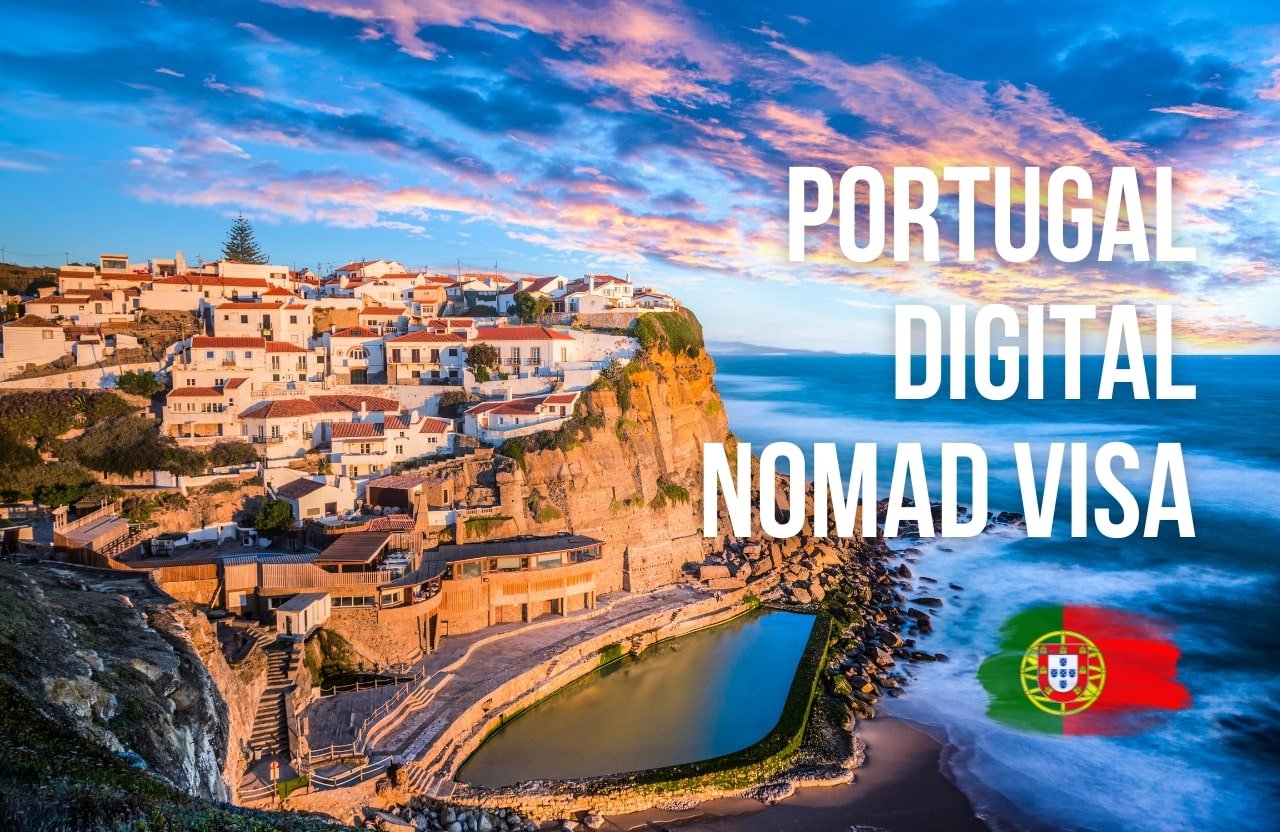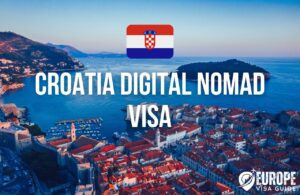
Table of Contents
Are you a remote worker or freelancer looking for a fantastic destination to live and work? Look no further than Portugal! In October 2022, the Portuguese government launched the new digital nomad visa, providing an excellent opportunity for individuals like you to obtain residency in this beautiful country. With its relatively straightforward application process and a range of benefits, the Portugal Digital Nomad Visa has become a popular choice for digital nomads worldwide. In this comprehensive guide, we will walk you through the application process, eligibility requirements, associated fees, and alternative visa options. So, let’s dive in and discover how you can make Portugal your new home as a digital nomad in 2024!
Introduction
Portugal, with its vibrant culture, stunning landscapes, and favorable tax policies, has become a top choice for digital nomads worldwide. The launch of the Portugal Digital Nomad Visa in October 2022 has further solidified its position as a digital nomad hotspot. This visa provides an opportunity for remote workers and freelancers to obtain residency in Portugal, offering a range of benefits including a straightforward application process, path to Portuguese/EU citizenship, visa-free travel across Europe, and access to certain tax benefits via Portugal’s NHR program.
Whether you’re looking for a short-term stay or a long-term commitment, Portugal has something to offer for every digital nomad. In the following sections, we will delve into the details of the Portugal Digital Nomad Visa, including its benefits, eligibility requirements, associated fees, and alternative visa options.
Benefits of the Portugal Digital Nomad Visa
The Portugal Digital Nomad Visa offers a host of benefits that make it an attractive option for remote workers and freelancers. Let’s take a closer look at some of these advantages.
- Relatively straightforward application process: One of the major advantages of the Portugal Digital Nomad Visa is its relatively straightforward application process. Unlike some other visa options, there is no need to find an employer or sponsor in Portugal. This simplicity makes it easier for digital nomads to navigate the application process and secure their residency.
- Path to Portuguese/EU citizenship after five years of residency: Obtaining the Digital Nomad Visa Portugal opens up a path to Portuguese/EU citizenship for individuals who meet the residency requirements. After five years of continuous residency in Portugal, including passing the CIPLE language exam at A2 level, digital nomads can apply for citizenship. This provides an excellent opportunity for those seeking long-term settlement in Portugal or the European Union.
- Allows you the option of working in Portugal: Once you have your residence permit as a digital nomad in Portugal, you have the option to work within the country. This flexibility allows you to explore local job opportunities or even start your own business in Portugal. It opens up a range of possibilities for professional growth and networking within the Portuguese market.
- Opens up visa-free travel across Europe: Having the Portugal Digital Nomad Visa grants you visa-free travel across Europe. This is particularly useful if you previously required a Schengen visa to travel within the European Union. With the digital nomad visa, you can freely explore and experience the diverse cultures and landscapes of Europe without the hassle of obtaining additional visas.
- Access to certain tax benefits via Portugal’s NHR program: Portugal’s Non-Habitual Resident (NHR) program offers certain tax benefits to individuals who meet the eligibility criteria. While this program is subject to change, it currently provides favorable tax rates for foreign-source income. Digital nomads can take advantage of this program to optimize their tax situation and potentially reduce their tax burden.
The Different Routes Explained
The Portugal Digital Nomad Visa offers two different routes for individuals seeking residency: the long-term residency visa and the temporary stay visa. Let’s explore these options in detail.
- The long-term residency visa: The long-term residency visa is valid for four months after you arrive in Portugal. However, it is important to note that you will need to convert it into a residence permit once you arrive. This route is suitable for individuals who have the long-term goal of applying for Portuguese citizenship. It provides a clear path towards permanent residency and eventual citizenship.
- The Temporary Stay Visa: The temporary stay visa is valid for one year and can be renewed. It allows multiple entries into Portugal but does not lead to a residence permit. This route is ideal for digital nomads who want to experience Portugal for a short time, longer than the 90-day Schengen tourist allowance, without committing to becoming a long-term resident. It provides flexibility for those who may want to explore multiple destinations as digital nomads.
Both types of visas have the same income requirements and document requirements. The key difference lies in the long-term residency visa’s additional step of applying for a residence permit at the immigration authority upon arrival in Portugal. For those opting for a temporary stay visa, this step is not necessary.
Eligibility Requirements
Portugal digital nomad visa requirements, there are certain requirements that applicants must meet. Let’s take a closer look at these eligibility criteria.
- Age and Citizenship: Applicants must be aged over 18 and be a non-EU/EEA and non-Swiss citizen to qualify for the Portugal Digital Nomad Visa. This visa is specifically designed for individuals from outside the European Union, European Economic Area, and Switzerland.
- Remote work or freelance status:To be eligible for the digital nomad visa, applicants must be fully remote workers for a non-Portuguese company or freelancers with clients outside of Portugal. This visa is intended for individuals who can work independently and generate income from sources outside of Portugal.
- Minimum monthly income requirement: Applicants must demonstrate a total monthly income of at least €3,040 (or the equivalent in other currencies) to meet thePortugal digital nomad visa income requirements. This income must come from a source outside of Portugal.
- Accommodation arrangement: Applicants must show proof of at least one year of accommodation in Portugal already arranged. This can be in the form of a lease registered with the tax authority. Having a secure housing arrangement demonstrates that applicants are prepared for their stay in Portugal.
It is important to note that these eligibility requirements are subject to change, and it is always advisable to check with official government sources or consult with legal professionals to ensure the accuracy of the information.
Bringing Your Family to Portugal
Digital nomads who wish to bring their families with them to Portugal can do so under the digital nomad visa. However, there are certain requirements and considerations to keep in mind.
Under the digital nomad visa, eligible family members who can accompany the primary applicant include the spouse or long-term partner, dependent children under 18, children aged between 18 and 35 (provided they are unmarried and financially dependent on the primary applicant), and parents aged over 65 (or younger if financially dependent on the primary applicant). It is essential to provide sufficient proof of income to support all family members during the stay in Portugal.
Each family member will need to meet the same eligibility requirements and provide the necessary documentation as outlined for the primary applicant.
Income Requirements and Associated Fees
To successfully obtain the Portugal Digital Nomad Visa, applicants must meet specific income requirements and pay associated fees. Let’s delve into these details.
- Monthly income requirement: Applicants must prove that their total monthly income is at least €3,040 to meet the income requirement for the digital nomad visa. This income should come from a source outside of Portugal.
- Savings requirement: In addition to the monthly income requirement, applicants must demonstrate savings of at least €36,480 (or the equivalent in their home currency). This savings amount should be a minimum of 12 times the monthly salary. These savings act as a safety net and show that applicants have the financial means to support themselves during their stay in Portugal.
- Government fees: There are several government fees that applicants need to pay during the visa application process. As of 2023, the fees are as follows:
- Temporary stay visa: €75
- Long-term visa: €90
- Private medical insurance: Each person applying for the digital nomad visa, including family members, must have private medical insurance for the first 6-12 months in Portugal. Once the residence card is obtained, individuals can join Portugal’s state health care system.
- Accommodation costs: One significant cost associated with obtaining the digital nomad visa is renting accommodation for the first 12 months. Rent costs in popular cities like Lisbon, Porto, and Funchal can be high. It is advisable to explore more affordable options in smaller Portuguese towns in the north or center of the country.
Online platforms like Flatio can help digital nomads find convenient accommodation options with flexible conditions, suitable for visa applications.
Document Requirements
When applying for the Portugal Digital Nomad Visa, applicants must provide specific documents to support their application. Let’s take a look at the required documentation.
- Valid passport: Applicants need to provide a valid passport copy as part of their visa application. The passport should have an expiration date that extends beyond the intended stay in Portugal.
- Passport-sized photos: Two passport-sized photos are required as part of the visa application process. These photos should meet the specifications set by the Portuguese embassy or consulate.
- Employment contract or freelancer agreements: Applicants must provide copies of their employment contract (if employed) or freelancer agreements with their clients (if freelance). These documents demonstrate the nature of their work and the source of their income.
- Bank statements: Bank statements showing income of at least €3,040 (or equivalent) are required as proof of the minimum monthly income. It is preferable to provide six months’ worth of bank statements to establish a history of consistent income. Applicants must also provide bank statements showing a minimum of €36,480 in savings. This demonstrates financial stability and the ability to support themselves during their stay in Portugal.
- Proof of clean criminal record: Applicants need to provide proof of a clean criminal record from their country of citizenship and any other countries where they have lived for over six months. This ensures that applicants meet the necessary character requirements for the visa.
- Proof of accommodation: Applicants must provide proof of accommodation, such as a tenancy agreement of a minimum of 12 months. If the applicant has purchased property, they can provide the deed as proof of accommodation. The landlord must register the tenancy agreement with the tax authorities. A letter of intention in English, explaining the reasons for wanting to move to Portugal, may also be required.
- Private health insurance policy: Applicants must provide proof of an active private health insurance policy that covers the whole Schengen zone and is valid for at least six months. This ensures that applicants have adequate health coverage during their stay in Portugal.
- Portuguese taxpayer’s number and local bank account: Before submitting the visa application, applicants need to obtain a Portuguese taxpayer’s number (NIF) and open a local bank account. Most embassies prefer to see proof of savings from a Portuguese bank account rather than a foreign bank account.
These document requirements can vary, and it is essential to check with the Portuguese embassy or consulate where the application will be submitted for any additional documentation that may be required.
Alternatives to the Digital Nomad Visa
While the Portugal Digital Nomad Visa provides an excellent pathway for remote workers and freelancers, there are alternative visa options that may be more suitable for certain individuals. Let’s explore these alternatives.
D7 Visa – Passive Income Visa
The D7 visa, originally designed for pensioners, is a viable alternative for individuals with passive income from outside of Portugal. Eligible types of passive income include pension income, dividends, rental income, or royalties. This visa option was previously available to remote workers, but the digital nomad visa is now the preferred route for individuals with salaried remote work or freelance income.
The D7 visa has a lower monthly income requirement, with proof of one month of Portugal’s minimum wage (€760) and 12 times that amount in savings. However, this amount may not be sufficient for a comfortable lifestyle, particularly in major cities like Lisbon, Porto, or Funchal. It is advisable to show proof of at least €1000 per month or more to strengthen the application.
D2 Visa – Business Visa
The D2 visa is another alternative for individuals without remote work or passive income. This visa is suitable for those planning to open a new business in Portugal, establish a Portuguese branch of an existing business, or run a business that is already established in Portugal. Success with the D2 visa depends on having a viable business or business idea that can be operated in Portugal.
There are no restrictions on the type of business, allowing individuals to pursue various entrepreneurial endeavors. However, the D2 visa involves additional financial responsibilities, such as Portuguese corporation tax and social security contributions. Compared to the digital nomad visa, the D2 visa application process is more complex and requires careful consideration of business plans and financial means.
It is important to assess individual circumstances and consult with legal professionals to determine the most suitable visa option.
Residency in Portugal for EU Citizens
If you are an EU passport holder, you have the freedom to work remotely in Portugal without the need for the digital nomad visa. EU citizens can enter Portugal freely and stay for up to three months without registering. If you wish to stay longer than three months, it is recommended to declare your presence at the local municipality office and obtain a temporary residency certificate known as the CRUE. This certificate is usually valid for five years. While EU citizens have more flexibility in terms of residency, it is still essential to comply with local regulations and ensure that the intended stay in Portugal is within the legal framework.
FAQs
Here are some frequently asked questions related to the Portugal Digital Nomad Visa:
Do digital nomads pay tax in Portugal?
If you stay in Portugal for longer than 183 days in a year, you may be considered a tax resident and may be required to pay tax on your worldwide income. However, Portugal’s NHR tax scheme offers certain tax benefits for foreign-source income. It is recommended to consult with a professional tax advisor to understand your specific tax situation.
Do I need a visa to be in Portugal?
EU passport holders can enter Portugal freely and stay indefinitely without a visa. Third-country nationals with a special agreement with Portugal can enter without a visa for stays of up to 90 days in 180. Other nationalities will require a Schengen visa to enter Portugal. It is advisable to check the visa requirements based on individual nationality and consult with official government sources.
Why is Portugal the best place to work as a digital nomad?
Portugal offers a range of advantages that make it an ideal destination for digital nomads. With its fast Internet speeds, diverse destinations, and excellent infrastructure for digital nomads, Portugal provides a conducive environment for remote work. From the vibrant city of Lisbon to the stunning island of Madeira, Portugal offers a wealth of cultural experiences and natural beauty. The affordable cost of living and entrepreneurial opportunities further enhance its appeal.
What’s the internet speed like in Portugal?
Internet speed in Portugal is generally excellent, particularly in major cities and on Madeira Island. The highest internet speed available in Portugal is 1 Gbit/s, with standard internet service providing around 350 Mbit/s. The implementation of fiber optic internet is still ongoing, further improving the internet infrastructure in the country.
Conclusion
Portugal has emerged as a top destination for digital nomads, and the introduction of the Portugal Digital Nomad Visa has made it even more attractive for remote workers and freelancers. With its straightforward application process, path to Portuguese/EU citizenship, visa-free travel across Europe, and access to certain tax benefits, Portugal offers a range of opportunities for digital nomads.
Whether you choose the long-term residency visa or the temporary stay visa, Portugal provides an excellent environment for work and leisure. Remember to carefully review the eligibility requirements, document requirements, and associated fees when applying for the digital nomad visa. Consider alternative visa options if they better suit your circumstances. With its vibrant culture, stunning landscapes, and entrepreneurial spirit, Portugal awaits you as a digital nomad in 2024. Start your journey today and make Portugal your new home!
Additional Resources
For more information and resources on the Portugal Digital Nomad Visa, consider exploring the following:
- Portugal HQA Visa: Ultimate 2024 Guide [FASTEST Investor Visa]
- Portugal Golden Visa: The Ultimate 2024 Guide
- Digital Nomad Visas for Easy Access to Europe in 2024
These resources can provide further insights and guidance as you navigate the process of obtaining the Portugal Digital Nomad Visa.





